and the distribution of digital products.
8 Best Tools for Startups
Startup tools are a collection of materials created to make different parts of starting and expanding a new firm easier. These tools frequently include financial management platforms like QuickBooks or Xero, communication tools like Slack or Microsoft Teams, project management platforms like Trello or Asana, and customer relationship management (CRM) software like HubSpot or Salesforce. Additionally, to efficiently manage outreach and social media efforts, firms commonly use marketing platforms like Hootsuite or Mailchimp. Here, in this article, we will discuss some of the finest tools that you can use to prosper in your startup.
Top tools and resources for startups 1. QuickBooks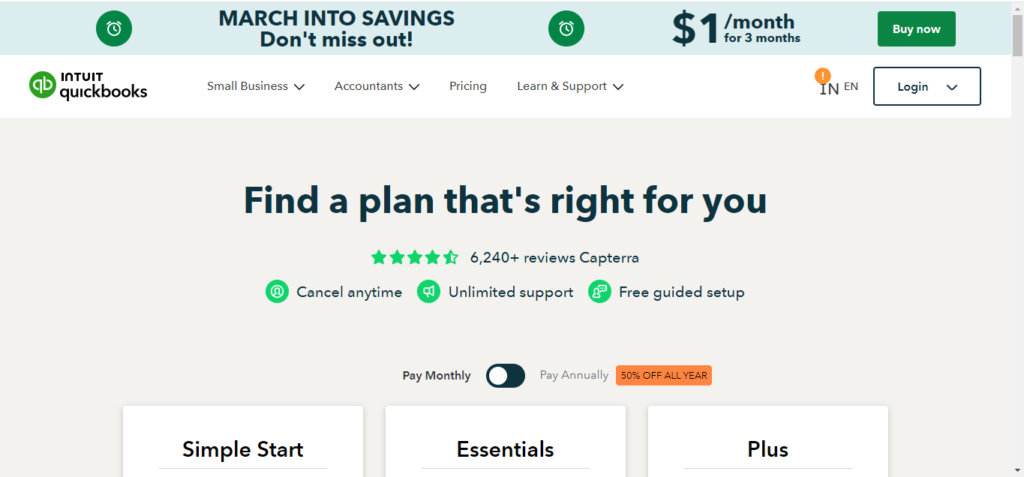
QuickBooks is an accounting software intended for small and medium-sized enterprises. It assists with payroll, inventory, costs, and invoicing management. It helps with tax preparation, creates reports, and streamlines financial duties with its user-friendly features. QuickBooks ensures accuracy in business transactions and facilitates financial administration, saving time.
Pros:- QB has basic accounting functionality and is based on a process that starts with creating an invoice.
- It’s convenient for multiple users to access it from different locations.
- It is user-friendly, easy to use, and well integrated.
- There is no functionality to send sales receipts for bank transactions.
- Bad working match functionality for bank transactions.
- It’s extremely buggy, and the support is non-existent.
There are three plans available: Simple Start (US$1/month), Essentials (US$1/month), and Plus (US$1/month).
Also, you may read 8 Best HR Software for Startups
TRY QUICKBOOKS NOW! 2. Xero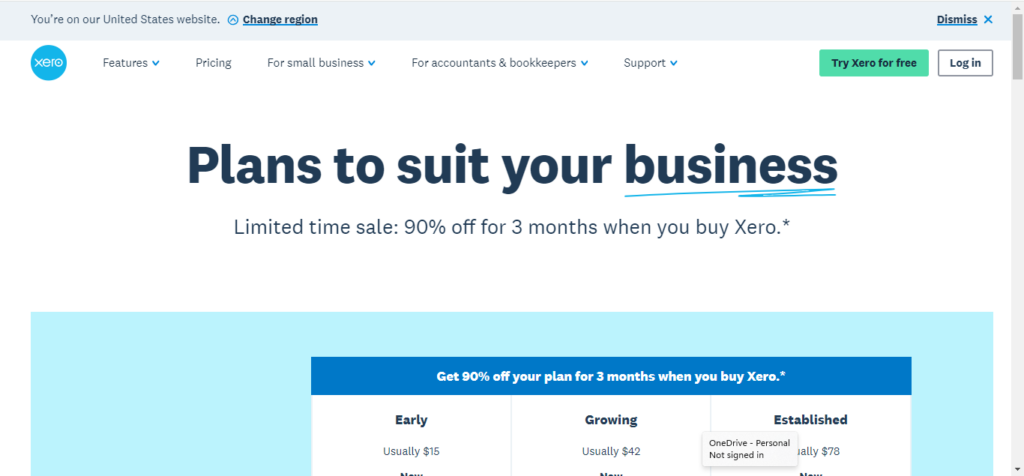
Xero is small business accounting software designed in the cloud. It has functions for managing payroll, tracking expenses, bank reconciliation, and invoicing. Xero facilitates simple access and teamwork through user-friendly interfaces and mobile applications. It offers instantaneous financial data insights, promoting effective decision-making and company expansion.
Pros:- Xero streamlines workflows and boosts productivity by integrating with a variety of third-party apps and services, including payroll software, CRM software, and payment processors.
- It is cloud-based and easily accessible from anywhere.
- Payroll is relatively simple.
- Its user-friendly interface and comprehensive features make financial management tasks easy and efficient.
- The tools in the program are disorganized.
- The new invoicing screen slows down work.
- Pricing structure may not be the most budget-friendly option for small businesses or startups.
There are three plans available: early ($1.50 USD per month), growing ($4.20 USD per month), and established ($7.80 USD per month).
TRY XERO TODAY! 3. Slack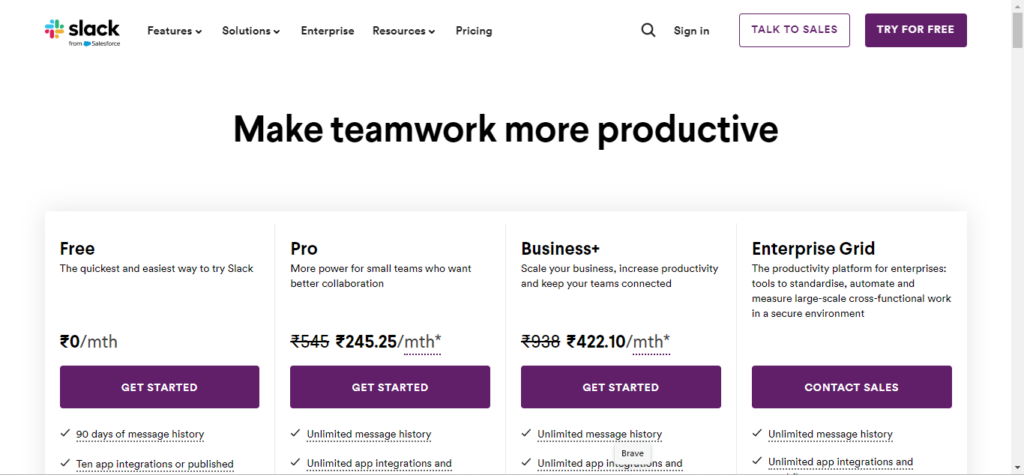
Slack is a platform for team communication that provides file sharing, chat, and tool integration. It streamlines communication via voice or video calls, direct messaging, and topic-organized channels. Slack improves productivity by keeping teams connected and informed regardless of location or time zone through configurable notifications and search features.
Pros:- It is versatile and provides ease of communication.
- It’s great for both casual conversations and professional collaboration. The ability to organize discussions into different channels makes it easy to keep track of topics and projects.
- Features like threaded conversations, file sharing, and integrations with other tools make it a powerful platform for team communication and productivity.
- You can create multiple channels, and it is super user-friendly, with group chat being one of the best features showcased by Slack.
- Managing notifications effectively becomes a daunting task.
- It’s still a little bit of a learning curve for some to get the most out of the platform.
- Costing is one major factor when it comes to the drawbacks of Slack.
It is available for free. Other premium plans include Pro, Business+, and Enterprise Grid.
Also, you may read 8 Best Content Marketing Software for Startups
TRY SLACK RIGHT NOW! 4. Asana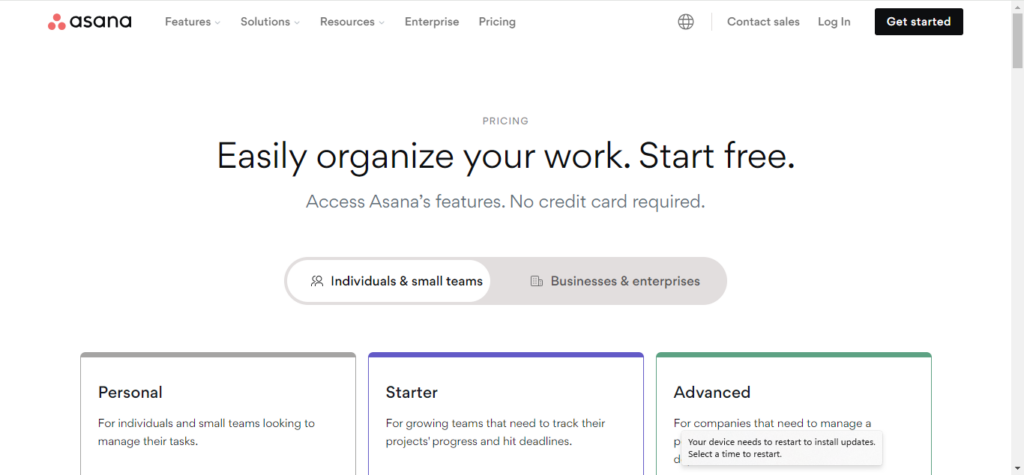
Asana is a project management application that facilitates efficient teamwork, task organization, and progress tracking. Task assignments, deadlines, and project timeframes are among the capabilities it provides. Through its user-friendly interfaces and adaptable workflows, Asana facilitates project management, promoting collaboration and efficiency throughout enterprises.
Pros:- Asana is a great tool for building project timelines and shifting responsibility to cross-functional partners.
- It cuts down on the need for creating multiple reports for different teams on the same project.
- Asana can also integrate with apps that you use daily, and the implementation process is easy.
- One feature missing in Asana is a clear way to access database information, as you would find in other project management programs.
- The pricing structure is the biggest downside to Asana.
- There is some lack of privacy and management rules.
It is available for free. Other premium plans include Starter (USD 10.99 per month) and Advanced (USD 24.99 per month).
TRY ASANA NOW! 5. HubSpot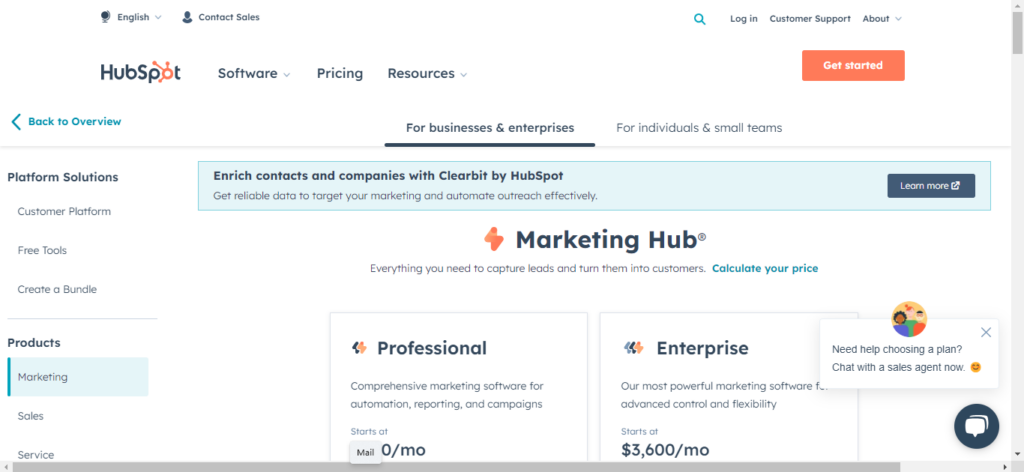
HubSpot is a comprehensive software suite for sales, marketing, and customer support. It offers social media management, email marketing, CRM, and website analytics tools. HubSpot helps organizations attract, engage, and delight consumers throughout their journey, boosting growth and fostering long-lasting connections. It does this through automated capabilities and personalized content.
Pros:- Building robust tech stacks to accomplish almost any business need and openly sharing data is a key feature.
- Hubspot can help you clean up inconsistent data and maintain clean data.
- It saves time, is easy-to-use, and requires no HTML customization.
- The new drag-and-drop editor and functionality additions to workflows.
- Reporting tools are far less intuitive than the other portions of the platform.
- There are also historical restrictions on the reports to 30 days in some cases.
- Lack of some common functions in different CRMs, like resending emails.
There are two plans available: Professional ($800 per month) and Enterprise ($3600 per month).
Also, you may read Best accounting books for your small business
TRY HUBSPOT TODAY! 6. Salesforce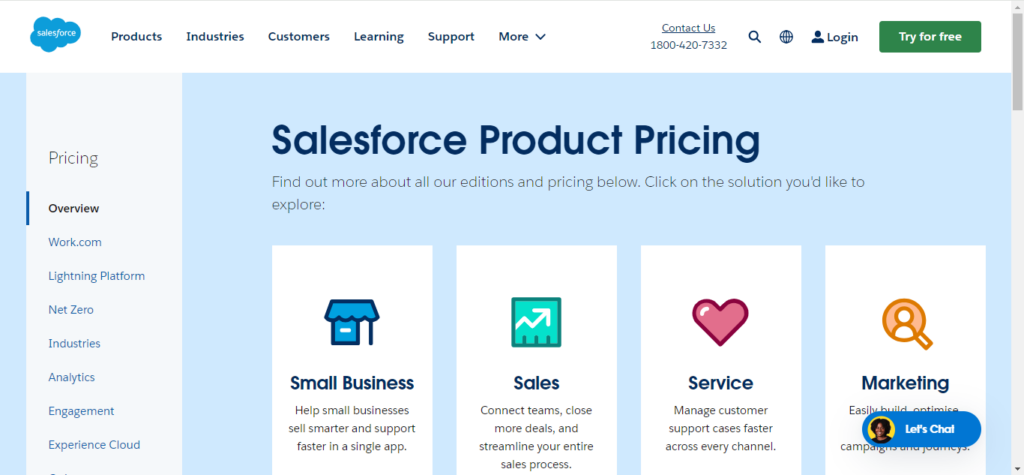
Salesforce is an online platform for customer relationship management (CRM) that assists companies in handling sales, marketing, and customer support. It provides analytics, pipeline tracking, and lead management functions. Salesforce enables businesses to efficiently foster deeper client relationships and business growth through configurable workflows and automation.
Pros:- There are dedicated support specialists who will usually help with the specific issue you are having rather than redirecting you.
- It tracks leads, accounts, contacts, and opportunities, and the screens are very similar, so it’s easy to learn.
- The platform is very customizable, so it can be tailored to your specific needs.
- The admin interface and toolset are very inconsistent and unnecessarily complex.
- As Salesforce is modular, it can get expensive to get the licenses required.
- There is a high learning curve with the software for both admins and users; it is not easy to use without training.
There are two plans available for small businesses and startups: the Starter Suite ($24 per month) and the Pro Suite ($100 per month).
TRY SALESFORCE RIGHT NOW! 7. Hootsuite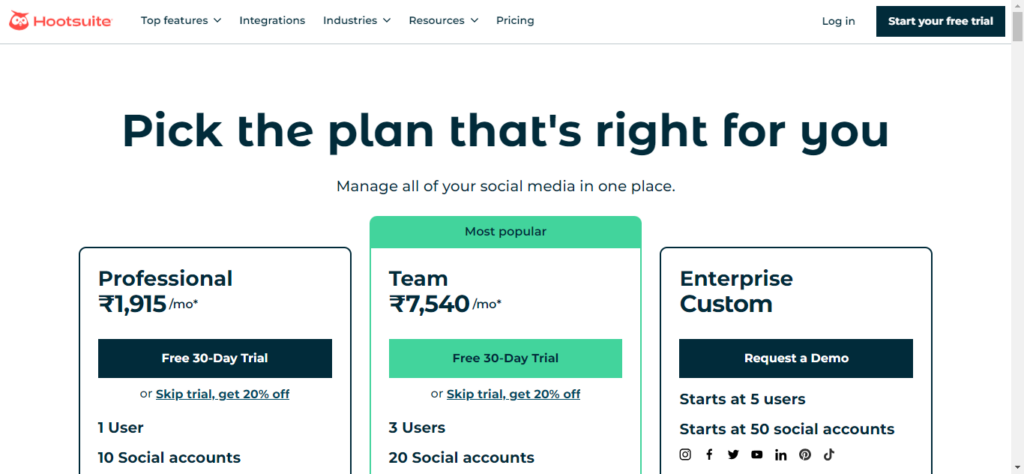
Businesses can plan, organize, and monitor their social media content across many platforms with Hootsuite, a social media management tool. With the help of its capabilities, which include analytics, monitoring, and content scheduling, users can successfully engage their audience and manage their social media presence.
Pros:- It is easy to implement basic to advanced levels of social media management.
- It exhibits exceptional customer service.
- Hootsuite’s user-friendly interface makes it accessible for social media beginners and experts, offering a seamless experience.
- The content drafting section not only spell-checks your posting, but it also provides recommendations to rephrase sentences better.
- The software can sometimes seem a little robotic and slow to respond.
- Sometimes essential notifications do not pop up.
There are three plans available: Professional (Rs. 1915 per month), Team (Rs. 7540 per month), and Enterprise Custom.
Also, you may read 10 Best Small Business HR Software
TRY HOOTSUITE NOW! 8. Mailchimp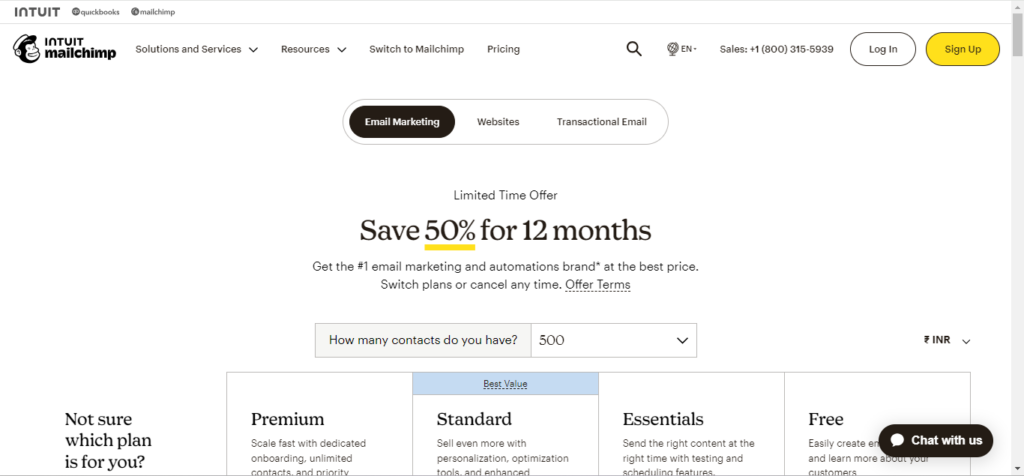
Mailchimp is a platform for email marketing that assists companies with email campaign planning, distribution, and analysis. Features like audience segmentation, marketing automation, and editable templates are available. Businesses can efficiently reach their target audience and expand their client base using Mailchimp’s insights into audience behavior and campaign performance.
Pros:- Its ability to generate marketing campaigns and manage marketing is exceptional.
- It provides a valuable aid in examining different components of your email campaigns and determining the best way to target them.
- It is simple to redirect and create emails to send them to categories and set a specific schedule for them to be sent.
- Mailchimp does not have technical support, so responses are slow to arrive.
- Occasional bugs and glitches may be observed.
It is available for free. Other pricing plans include Premium (Rs. 11500 per year), Standard (Rs. 575 per year), and Essentials (Rs. 385 per year).
TRY MAILCHIMP TODAY! ConclusionHaving the appropriate tools is essential for success in the cutthroat world of startups. Startups benefit from a variety of tools customized to their needs, from managing finances with QuickBooks to optimizing communication with Slack and cultivating customer relationships using HubSpot and Salesforce. The toolbox is complete with the addition of Asana for project management and Mailchimp for email marketing, enabling entrepreneurs to effectively traverse obstacles, optimize processes, and eventually prosper in dynamic markets.
Frequently Asked Questions Are startups small businesses?Startups are a subclass of small businesses distinguished by their creative ideas, capacity for quick growth, and aspirations for scalability. Not all small firms are startups, even if all startups are initially tiny businesses. Startups, which are frequently propelled by technology or original company concepts, generally strive for notable expansion and disruption within their sector.
What are the best resources and tools that can be used for a startup business?Tools like HubSpot for marketing, Asana for project management, QuickBooks for accounting, and Salesforce for customer relationship management are important for the success of startups. Furthermore, tools like Mailchimp for email marketing and Slack for team communication are priceless. These tools facilitate cooperation, simplify processes, and efficiently propel expansion.
What are the best freely available startup tools?Startup tools that are free to use include Canva for graphic design, HubSpot CRM for customer relationship management, Google Analytics for website analytics, Trello for project management, and Buffer for social media scheduling. These technologies give startups the necessary features without breaking the bank, allowing them to run their operations and grow their companies successfully.
- Home
- About Us
- Write For Us / Submit Content
- Advertising And Affiliates
- Feeds And Syndication
- Contact Us
- Login
- Privacy
All Rights Reserved. Copyright , Central Coast Communications, Inc.